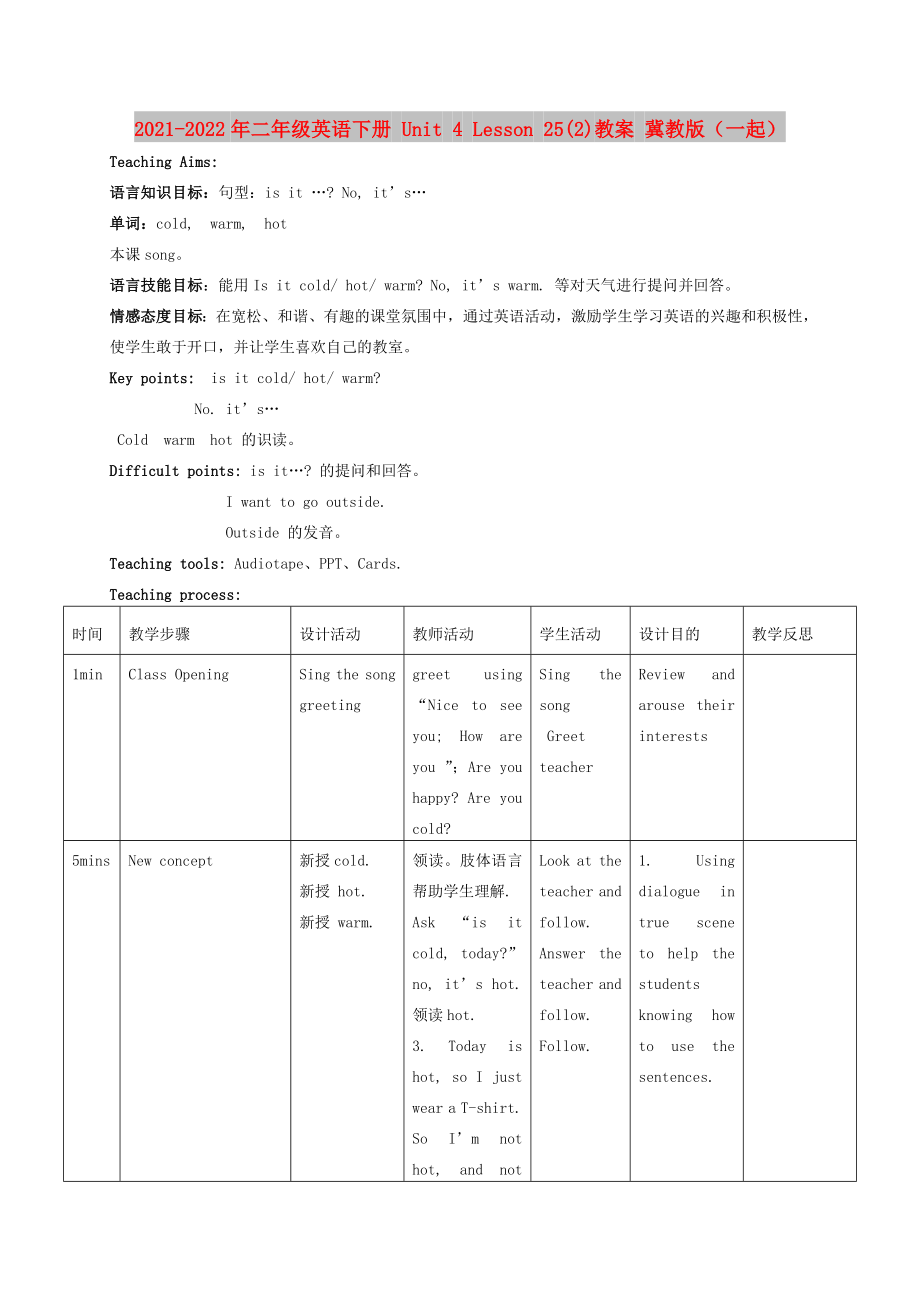《2021-2022年二年級(jí)英語(yǔ)下冊(cè) Unit 4 Lesson 25(2)教案 冀教版(一起)》由會(huì)員分享���,可在線(xiàn)閱讀�����,更多相關(guān)《2021-2022年二年級(jí)英語(yǔ)下冊(cè) Unit 4 Lesson 25(2)教案 冀教版(一起)(4頁(yè)珍藏版)》請(qǐng)?jiān)谘b配圖網(wǎng)上搜索。
1�����、2021-2022年二年級(jí)英語(yǔ)下冊(cè) Unit 4 Lesson 25(2)教案 冀教版(一起)
Teaching Aims:
語(yǔ)言知識(shí)目標(biāo):句型:is it …? No, it’s…
單詞:cold, warm, hot
本課song�����。
語(yǔ)言技能目標(biāo):能用Is it cold/ hot/ warm? No, it’s warm. 等對(duì)天氣進(jìn)行提問(wèn)并回答�����。
情感態(tài)度目標(biāo):在寬松����、和諧、有趣的課堂氛圍中�����,通過(guò)英語(yǔ)活動(dòng),激勵(lì)學(xué)生學(xué)習(xí)英語(yǔ)的興趣和積極性����,使學(xué)生敢于開(kāi)口,并讓學(xué)生喜歡自己的教室�����。
Key points: is it cold/ hot/ warm?
2����、 No. it’s…
Cold warm hot 的識(shí)讀。
Difficult points: is it…? 的提問(wèn)和回答��。
I want to go outside.
Outside 的發(fā)音����。
Teaching tools: Audiotape、PPT�����、Cards.
Teaching process:
時(shí)間
教學(xué)步驟
設(shè)計(jì)活動(dòng)
教師活動(dòng)
學(xué)生活動(dòng)
設(shè)計(jì)目的
教學(xué)反思
1min
Class Opening
Sing the song
greeting
greet using “N
3��、ice to see you; How are you ”;Are you happy? Are you cold?
Sing the song
Greet teacher
Review and arouse their interests
5mins
New concept
新授cold.
新授 hot.
新授 warm.
領(lǐng)讀�。肢體語(yǔ)言幫助學(xué)生理解.
Ask “is it cold, today?” no, it’s hot. 領(lǐng)讀hot.
3. Today is hot, so I just wear a T-shirt. So I’m not hot
4、, and not cold. I’m warm.
Look at the teacher and follow.
Answer the teacher and follow.
Follow.
1. Using dialogue in true scene to help the students knowing how to use the sentences.
6mins
Practice 1
1.listen and do
2.look and guess
1.give the direction
2. Choose one student to act.
5�、
1. listen to the teacher and do.
2. Look at the student’s action and guess it’s hot or cold.
Practice with interests, remember the language points easily.
5mins
Text learning
新授is it…?
Look at the text, listen and imitate follow the tape.
Make dialogue in pairs.
1. 領(lǐng)讀句型
2.Play audio
6、tape and give question. Check if there are any questions.
1. Follow.
2.Listen, answer and imitate the text,
3. Make dialogue in pairs.
Let the students to imitate pure language. And advance students’ listening ability
To check if there are any mistakes.
5mins
Practice 2
Talk about pictu
7��、res.
Show the pictures.
Talk about the pictures
Advance students’ speaking ability.
5mins
Sing a song
Learn the new song
Play the tape, sing and help to understand.
Listen and sing
Make interest to learn English.
5mins
Practice 3
Do the exercises on Activity Book.
1.Tell the titl
8����、e requirements
to the students. 2. Go around the classroom to see if there are any questions.
Do the exercises on Activity Book.
Advance students’ writing ability.
Help the students remember the words deeply.
1mins
Class closing
sing a song
homework
Homework: 1. Listen and read
9、the text.
2. Draw the pictures of cold, warm, or hot.
Sing a song
Let them to remember deeply.
附送:
2021-2022年二年級(jí)英語(yǔ)下冊(cè) Unit 4 Lesson 26(1)拓展資料 冀教版(一起)
單元教材分析
本單元學(xué)習(xí)剩下的最后九個(gè)字母��,要求學(xué)生會(huì)寫(xiě)����、會(huì)讀����。所涉及的單詞都是生活中經(jīng)常用到的(服裝類(lèi)、交通工具����、表示冷暖的形容詞)。本單元的句型也是一些表示動(dòng)作的句子����。四年級(jí)的學(xué)生活潑好動(dòng)�,教師要?jiǎng)?chuàng)設(shè)不同的活動(dòng)來(lái)激發(fā)學(xué)生學(xué)英語(yǔ)的興趣���,并在本課的基礎(chǔ)上進(jìn)一步拓展���,培養(yǎng)她
10、們的語(yǔ)感��。
一����、教學(xué)設(shè)計(jì)思路
通過(guò)詢(xún)問(wèn)學(xué)生是如何來(lái)學(xué)校,出遠(yuǎn)門(mén)怎樣去�,引出本課單詞:bicycle、car and bus.或者是出示三幅圖畫(huà)����,讓學(xué)生跟讀。進(jìn)而在此基礎(chǔ)上拓展延伸�。
二、教學(xué)目標(biāo)
(一)知識(shí)
1. words: car bicycle bus
2. sentences: I walk to the park/school/shop.
I ride my bicycle.
I drive my car.
I walk beside the road.
On the roa
11����、d, I see cars, buses and bicycles.
(二)能力
能夠熟練運(yùn)用交通工具的名詞描述句子�����,表達(dá)是以何種方式到達(dá)某地��。
(三)情感
要根據(jù)實(shí)際情況選擇合適的交通工具��。
Lesson 26 教學(xué)建議
1.詢(xún)問(wèn)不同的學(xué)生今天是以何種方式到學(xué)校的�,進(jìn)而引出本課單詞:car�、bus and bicycle. 再分別讓不同的學(xué)生分別描述是怎樣來(lái)的學(xué)校。例如:I walk to the school. I ride my bicycle.
My dad drives with me. I take on the bus.
2..出示不同的圖畫(huà)��,讓學(xué)生進(jìn)行
12�����、練習(xí)����。例如:He walks to the park. She visits her grandma by bus. He goes to work by car.
3.播放一張張幻燈片����,從上面學(xué)生可以看到汽車(chē)、公共汽車(chē)�����、自行車(chē)等: On the road. I see cars、buses and bicycles.
4.老師讀出car����、bus 和bicycle,分別讓學(xué)生畫(huà)出來(lái),看誰(shuí)畫(huà)得又快又好����。
5.讓學(xué)生分小組討論一下這幾天分別都乘坐怎樣的交通工具去的什么地方。然后派一個(gè)代表總結(jié)����。
6.看看誰(shuí)還能說(shuō)出其它的交通工具:train、ship��、plane and motorbike and so on.
 2021-2022年二年級(jí)英語(yǔ)下冊(cè) Unit 4 Lesson 25(2)教案 冀教版(一起)
2021-2022年二年級(jí)英語(yǔ)下冊(cè) Unit 4 Lesson 25(2)教案 冀教版(一起)

